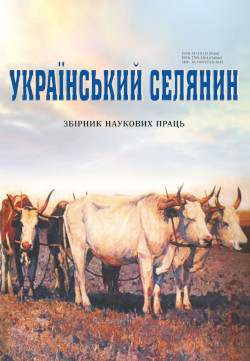The peasant issue in the Second Polish Republic in the conception by Franciszek Bujak
Main Article Content
Abstract
The purpose of the study is to fully reproduce F. Bujak’s vision of the problems of the peasantry in the Polish
state restored in 1918 on new foundations. At the same time, attention is drawn to the fact that F. Bujak was the founder of
Polish historical and economic studies, and also had experience in political activity as the Minister of Agriculture.
The scientific novelty is that for the first time the materials of the journal “Wieś i Państwo” are included in the scientific
circulation, based on which F. Bujak’s views on the relationship between the peasantry and the state in the interwar period are
reconstructed.
Conclusions. The view of the problem of the peasantry in interwar Poland by F. Bujak, a supporter of democracy and
social equality, was distinguished by its integrity and depth of understanding. The researcher considered the peasantry not only
the economic, but also the spiritual basis of the state. His attention was drawn to the issue of relations between the agrarian
state, which was then the Second Polish Commonwealth, and its own most numerous social group - the peasants. F. Bujak
presented quite balanced assessments of the real state of this problem, the solution of which he saw in the establishment of
national solidarity between different social strata. For this, he considered the need for state regulation and the presence of
socially significant laws to be justified. F. Bujak paid considerable attention to the problem of totalitarianism, in particular
the possibilities and features of its introduction in the young Polish state. He also analyzed the threats that such an evolution
of the political system could cause to the peasantry. F. Bujak considered the relations between the state and the peasants
in historical retrospect as a confrontation between the peasants and the nobility. In this context, he considered overcoming
mutual, historically determined prejudices to be one of the urgent tasks. And one of the main ways of this was supposed to be
the effective participation of the state in raising the educational and cultural level of the peasantry
Article Details

This work is licensed under a Creative Commons Attribution 4.0 International License.
References
Baran, Z. & Sypko, B. (2019). Ahrarna polityka polskoho uriadu v otsintsi F. Buiaka
[Agrarian policy of the Polish government in the assessment of F. Bujak]. Kwartalnik Kolegiumu
Ekonomiczno-Społecznego. Studia i Prace. N. 3, 89–102 [Quarterly of the College of Economics
and Social Sciences. Studies and Works. No. 3, 89–102]. Doi: 10.33119/KKESSiP.2019.3.4 [in
Ukrainian]
Budzyński, Z. (2007). Franciszek Bujak (1875−1953) [Francishek Bujak (1875−1953)].
Złota księga historiografii lwowskiej XIX i XX wieku. [The Golden Book of Lviv Historiography of
the 19th and 20th Centuries.] Rzeszów: Wydawnictwo Uniwersytetu Rzeszowskiego, s. 421−440
[Rzeszów: Publishing House of the University of Rzeszów, pp. 421−440]. [in Polish]
Bujak, F. (1918). O naprawie ustroju rolnego w Polsce [About repairing the agricultural
system in Poland]. Warszawa , 160 s. [in Polish]
Bujak, F. (1938). Chłop wyraziciel duha Polski [A peasant expressing the Polish spirit].
Wieś i Państwo, N8, s. 486–488 [Village and State, N8, pp. 486–488]. [in Polish]
Bujak, F. (1938). Szlachetczyzna [The noble]. Wieś i Państwo, N3, s. 161–168 [Village and
State, N3, pp. 161–168]. [in Polish]
Bujak, F. (1938). Wieś a Totalizm [Village and Totalizm]. Wieś i Państwo, N2, s. 88–92
[Village and State, N2, pp. 88–92]. [in Polish]
Bujak, F. (1938). Wieś i Państwo [Village and State]. Wieś i Państwo, N1, s. 5–12 [Village
and State, N1, pp. 5–12]. [in Polish]
Bujak, F. (1938). Z jednej gliny jesteśmy [We are from one clay]. Wieś i Państwo, N4,
s. 258–269 [Village and State, N4, pp. 258–269]. [in Polish]
Deivis, N. (2008). Bozhe ihryshche: istoriia Polshchi [God’s Playground: a history of
Poland]. K.: Vyd-vo Solomii Pavlychko “Osnovy”, 1080 s. [Kyiv. Publishing house of Solomia
Pavlychko «Osnovy», 1080 pages.] [in Ukrainian]
Grabski, A.F. (1976). Franciszek Bujak i historia gospodarcza (Uwagi o metodologicznych
poglądach uczonego) [Franciszek Bujak and economic history (Notes on the methodological views
of the scientist)]. Historyka, N9, s. 101−124 [Historyka, N9, pp. 101-124]. [in Polish]
Grabski, A.F. (2000) Zarys historii historiografii polskiej [An outline of the history of Polish
historiography]. Wydawnictwo Poznańskie, Poznań, 278 s. [Poznan Publishing House, Poznan, 278
pp.] [in Polish]
Kowalczyk, E. (2016). Agraryzm i jego wyraz w myśli społeczno-ekonomicznej F. Bujaka,
W. Stysia i W. Grabskiego [Agrarianism and its expression in the socio-economic ideas of F. Bujak,
W. Stys and W. Grabski]. Przegląd Prawa i Administracji. N 105, s. 85–98 [Review of Law and
Administration. N 105, pp. 85–98]. Doi: 10.19195/0137-1134.105.6 [in Polish]
Kula, W. (1963). Problemy i metody historii gospodarczej [Problems and methods of
economic history]. Warszawa: Wydawnictwo Naukowe PWN, 786 s. [Warshawa: PWN Scientific
Publishing House, 786 p.] [in Polish]
Madurowicz-Urbanska, H. (1976). Franciszek Bujak – o nowy kształt historii [Franciszek
Bujak – about the new shape of history]. Bujak F. Wybór pism [Bujak F. Selected Writings].
Warszawa: Wydawnictwo Naukowe PWN, t. 1, s. 37−170 [Warshawa: PWN Scientific Publishing
House, vol. 1, pp. 37-170]. [in Polish]
Pobóg-Malinowski, W. (1956). Najnowsza historia polityczna Polski 1864–1945 [The
recent political history of Poland 1864–1945], t.2., cz.1, Londyn, 665 s. [in Polish]
Shelton, A.K. (1989). The democratic idea in Polish history and historiography: Franciszek
Bujak (1875−1953). Colorado: Columbia University Press, 315 s. [in English]
Szafraniec, B. (2009). Franciszek Bujak (1875–1953). Życie, działalność naukowodydaktyczna i społeczna [Francishek Bujak (1875–1953). Life, scientific, didactic and social
activities]. Toruń, 305 s. [in Polish]
Topolski, J. (1963) Badania historyczno-gospodarcze w Polsce [Historical and economic
research in Poland]. Roczniki Dziejów Społecznych i Gospodarczych. N 25, s. 56–76 [Annals of
Social and Economic History. N 25, pp. 56–76]. [in Polish]
Wielka historia Polski: 1918–1939. (2000). [The Great History of Poland 1918–1939], t. 9,
[aut. t. Michał Śliwa]. Kraków, 272 s. [in Polish]

